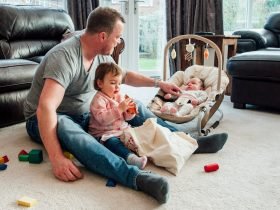How to Form a Secure Bond with Your Child

What if I told you that I understood the key to giving your child the tools to achieve real happiness, gratifying achievement, rewarding relationships, improved overall physical and mental health, and a sense of well-being that allowed them to weather life’s stresses with grace and resolve? What would you be willing to pay for such a powerful magical elixir? What if I told you, “You always had the power, my darling, you only had to learn it for yourself,” as Glinda the Good Witch put it? Creating a stable relationship with your child is the first step in being able to provide them the gifts stated above.
How to Make a Protected Attachment
A strong attachment link benefits a youngster for the rest of his or her life. Things like improved school grades, increased pleasure, and enhanced trust in others and the world in general. It also aids the child in forming more positive interactions with peers and authoritative figures. Children who have strong bonds with their parents are physically healthier and less impulsive. These advantages last well into adulthood. Developing a solid attachment does not suggest that you merely enjoy your child’s company or that you provide for all of their basic requirements, such as food, shelter, clothing, and education. There’s a lot more to it than that. By using the word SECURES as an acronym, I’ve covered the factors for forming a secure attachment.
Arriving on Time
Showing up is represented by the S in SECURE. Being physically and emotionally present for your child is referred to as “showing up.” Are your thoughts about your to-do list distracting you from being present when you’re on the floor playing with your child? Do you give your complete attention to your child when he or she comes to you sad or thrilled about something, or do you only listen half-heartedly?
Engaging in what your child is doing and/or how they are feeling is what it means to show up. It’s about actually listening to them while also making them feel like you’re fully invested in their experience. Showing up gives them the impression that they are important and that they matter. It also teaches kids that they are not alone. Children who have been neglected physically or emotionally may have doubts about their own existence and seek reassurance from others well into adulthood. They could seek out a lot of pleasant or even negative contacts. It makes little difference to them as long as they get a reaction from someone else, which confirms their existence.
Empathy
Empathy is represented by the E in SECURE. Empathy entails replicating your baby’s facial expressions or communicating with them that you see them feeling a specific way. You’re acknowledging their indicated emotion and why they’re feeling that way through their facial expressions. If they’re sobbing, for example, you could assume they’re hungry and that you’ll be bringing their bottle.
The ability to establish empathy in a safe bond is critical for stimulating the baby’s growing brain’s mirror neurons. This is where empathy begins to grow. When children are abused or neglected, their ability to develop empathy is harmed. Without empathy, serious consequences can occur long into adulthood, including personality disorders. A lack of empathy is one of the defining characteristics used to diagnose various personality disorders.
Co-regulation and consistency
The letter C in SECURE stands for two things: consistency and co-regulation. Consistently responding to a baby’s or child’s cry for help builds trust in others and in the world. It communicates to them that their needs are being heard and that they are important. Responding to requirements on a consistent basis should be done quickly and with sensitivity and awareness. When the baby is sobbing, for example, instead of jolting the baby upwards fast and forcefully, pick the baby up with delicacy and concern.
Warm and responsive interactions that provide the support, coaching, and modeling that children need to understand, express, and modulate their thoughts, feelings, and behaviors are referred to as co-regulation. A parent’s role in helping a youngster regulate their emotions is critical. At different ages, co-regulation will take on different forms. It may be a caregiver who is rocking a weeping baby. Alternatively, cuddling a preschooler who has a skinned knee. The goal is for the kid to be able to self-regulate, return to baseline, and require minimal co-regulation assistance from the caregiver.
Y-O-U!
SECURE’s U is a phonetic pun! The letter U stands for you! Children pick up traits from their parents, whether they’re positive or harmful. They observe and imitate their parents’ actions. Show gratitude to them, the waiter, the teacher, and others if you want your child to be grateful. Show children respect and act respectfully to others in front of them if you want them to be respectful. It’s not a case of “do as I say, not as I do.” You must be the change you want to see in your child. “Your children will become what you are; thus, be the person you want them to be!” – Bly, David
Resilience
SECURE’s R stands for resiliency. Despite the popular belief that “kids are extremely resilient,” resilience is not a fundamental trait. This justification is frequently used by adults to defend potentially poor actions and their consequences for children. Resilience is an acquired skill that results from the mending of a secure attachment that has been “broken” for a brief period of time. When the infant’s cries are not responded to quickly, for example. When a child screams because their parent is leaving them at home and the adult sneaks off without making a strong attempt to plan a party when they return.
Emotional Intelligence (EQ) is a term that refers to the ability
Emotional intelligence is represented by the second E in SECURE. EQ, or emotional intelligence, is a greater predictor of future success than IQ. Emotional intelligence has been found in studies to predict future success in relationships, health, and quality of life. Children with high EQs have been demonstrated to have better grades, stay in school longer, and make healthier decisions in general (for example, they are less likely to smoke).
Perhaps more crucially, having strong emotional intelligence predicts career success more than having a high IQ. Parents can help their children develop emotional intelligence by naming and categorizing feelings, facial expressions, and reading social stories about emotions,The Way I Feel and Gabi Garcia’s Listening to My Body. The Disney film Inside Out is another excellent resource for teaching children about emotions and how to label them.
It is critical to establish a healthy attachment link between the infant and the primary caregiver in order to provide our children the best chance at living their best lives.

























Leave a Reply
View Comments